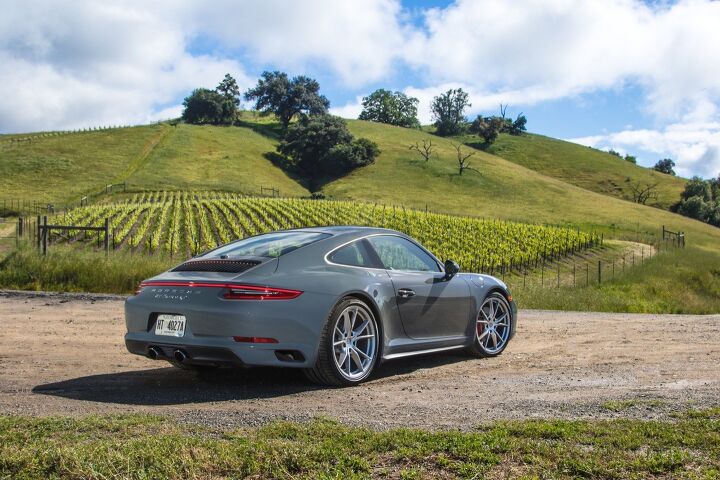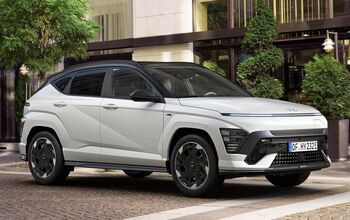You'll Have to Pry the Steering Wheel From Porsche's Cold, Dead Hands

Like BMW, which aims to keep gas-powered M cars in production for as long as humanly possible, Porsche is also making a commitment to motoring purity in the face of new technologies and government overreach. That circular device positioned in front of the driver? Porsche wants to keep it there.
The specter of Big Government and Big Safety conspiring to kill non-autonomous motoring is a real fear, one that’s been talked about more than a little here at TTAC. Call it the Red Barchetta scenario.
Porsche seems aware of it, too, though it tiptoes around the entity at the center of the issue. Nevertheless, the automaker claims a future Porsche “will be one of the last automobiles with a steering wheel.”
That’s the view of Lutz Meschke, vice-president of the company’s executive board and head of finance and IT. In an interview published by the automaker, Meschke lays out the short and medium-term future for both self-driving technology and the steering wheel.
No one knows what the long-term holds, but many of us, Meschke included, seem to believe it’s a future where safety tops personal autonomy. A future where your car drives you, no ifs, ands, or buts.
“A Porsche will always be a car that you will want and be able to drive yourself,” he said, adding much later that the act of driving “will hopefully remain the most important thing at Porsche for a very long time.” Still, Porsche isn’t going the Luddite route when it comes to assist-type features that drivers might want to pay extra for — or demand as standard kit.
From the parking lot to the racetrack, “We see digitalisation and autonomous driving not as a threat but as a tremendous opportunity,” Meschke said. For the former scenario, traffic jam assistants and automated parking systems are seen as the most useful features for the brand. For buyers in Porsche’s price range, these will soon become “must haves,” he said.
Luxury car ownership obviously means the option of taking it as easy as possible. Next year’s Cayenne brings the brand’s most advanced driver’s aids yet, Meschke claims. After that, the Mission E electric sedan ( due to appear in 2019) represents the next big leap in autonomous features.
For the weekend racer, automation could mean the ability to navigate a track like your favorite pedal jockey — just download a particular race, recorded by a driver piloting the same car on the same course, and learn from your vehicle. Porsche calls that idea the “Mark-Webber-function,” named after its seasoned brand ambassador.
“With this function, the vehicle could drive autonomously on a racetrack like the Nürnburgring – just like Webber would drive,” said Meschke. “The car drives an ideal course and demonstrates perfect brakes in the curves, where to best shift and where to accelerate. First, software saves the exact course Mark Webber drives on a racetrack. These data are used by the autonomous vehicle to drive the course identically. Afterwards the customer can reclaim the steering wheel and let the car show him the ideal course, thus training and improving his skills as a driver via direct feedback from the car. This is technically possible already. Of course, the driver can improve over time and learn new things.”
Naturally, other tracks and drivers would be part of such a hypothetical feature. Back in the real world, Porsche plans to make more of its money from digitalisation, the less-sexy, once-removed cousin of automation. For example, it already offers German customers the ability to order additional insurance online (“Porsche Shield”) before heading to the track.
In the medium term, Porsche hopes to generate a two-digit percentage of its business from digital services. As for the long term, well, that likely involves a rogue Porsche engineer in the last production 911 deftly avoiding Kraftfahrt-Bundesamt road safety drones as he races for the Swiss border.
[Image: Porsche]

More by Steph Willems
Latest Car Reviews
Read moreLatest Product Reviews
Read moreRecent Comments
- Varezhka I have still yet to see a Malibu on the road that didn't have a rental sticker. So yeah, GM probably lost money on every one they sold but kept it to boost their CAFE numbers.I'm personally happy that I no longer have to dread being "upgraded" to a Maxima or a Malibu anymore. And thankfully Altima is also on its way out.
- Tassos Under incompetent, affirmative action hire Mary Barra, GM has been shooting itself in the foot on a daily basis.Whether the Malibu cancellation has been one of these shootings is NOT obvious at all.GM should be run as a PROFITABLE BUSINESS and NOT as an outfit that satisfies everybody and his mother in law's pet preferences.IF the Malibu was UNPROFITABLE, it SHOULD be canceled.More generally, if its SEGMENT is Unprofitable, and HALF the makers cancel their midsize sedans, not only will it lead to the SURVIVAL OF THE FITTEST ones, but the survivors will obviously be more profitable if the LOSERS were kept being produced and the SMALL PIE of midsize sedans would yield slim pickings for every participant.SO NO, I APPROVE of the demise of the unprofitable Malibu, and hope Nissan does the same to the Altima, Hyundai with the SOnata, Mazda with the Mazda 6, and as many others as it takes to make the REMAINING players, like the Excellent, sporty Accord and the Bulletproof Reliable, cheap to maintain CAMRY, more profitable and affordable.
- GregLocock Car companies can only really sell cars that people who are new car buyers will pay a profitable price for. As it turns out fewer and fewer new car buyers want sedans. Large sedans can be nice to drive, certainly, but the number of new car buyers (the only ones that matter in this discussion) are prepared to sacrifice steering and handling for more obvious things like passenger and cargo space, or even some attempt at off roading. We know US new car buyers don't really care about handling because they fell for FWD in large cars.
- Slavuta Why is everybody sweating? Like sedans? - go buy one. Better - 2. Let CRV/RAV rust on the dealer lot. I have 3 sedans on the driveway. My neighbor - 2. Neighbors on each of our other side - 8 SUVs.
- Theflyersfan With sedans, especially, I wonder how many of those sales are to rental fleets. With the exception of the Civic and Accord, there are still rows of sedans mixed in with the RAV4s at every airport rental lot. I doubt the breakdown in sales is publicly published, so who knows... GM isn't out of the sedan business - Cadillac exists and I can't believe I'm typing this but they are actually decent - and I think they are making a huge mistake, especially if there's an extended oil price hike (cough...Iran...cough) and people want smaller and hybrids. But if one is only tied to the quarterly shareholder reports and not trends and the big picture, bad decisions like this get made.


































Comments
Join the conversation
Hey autonomous fanboi's...Roll this puppy out in Mumbai first, and lets see how THAT goes. Until then, its totally misplaced and underbaked. For First World urban transit bus routes, I can get it. The way its postulated as the next big thing? Not so much.
BMW, Porsche and a few others recognize that some of us actually like driving and have no intention of giving up the enjoyable activity to computers.